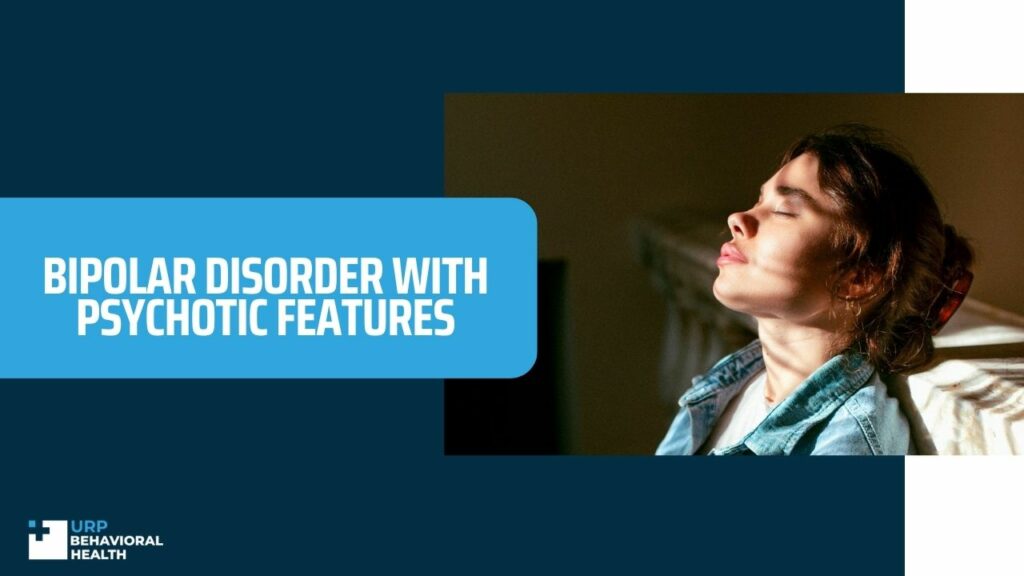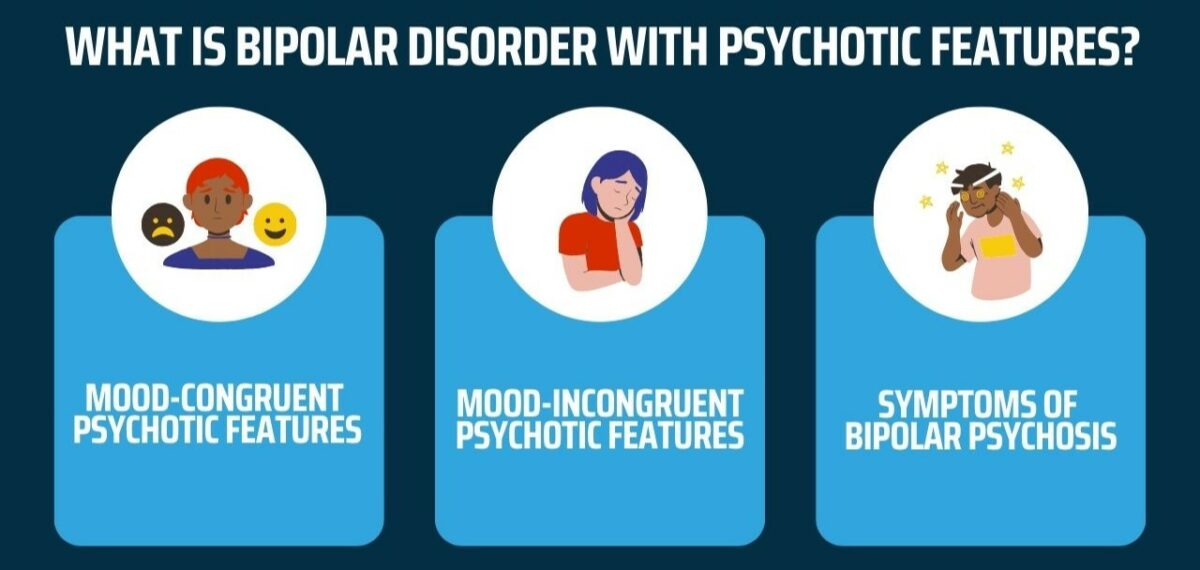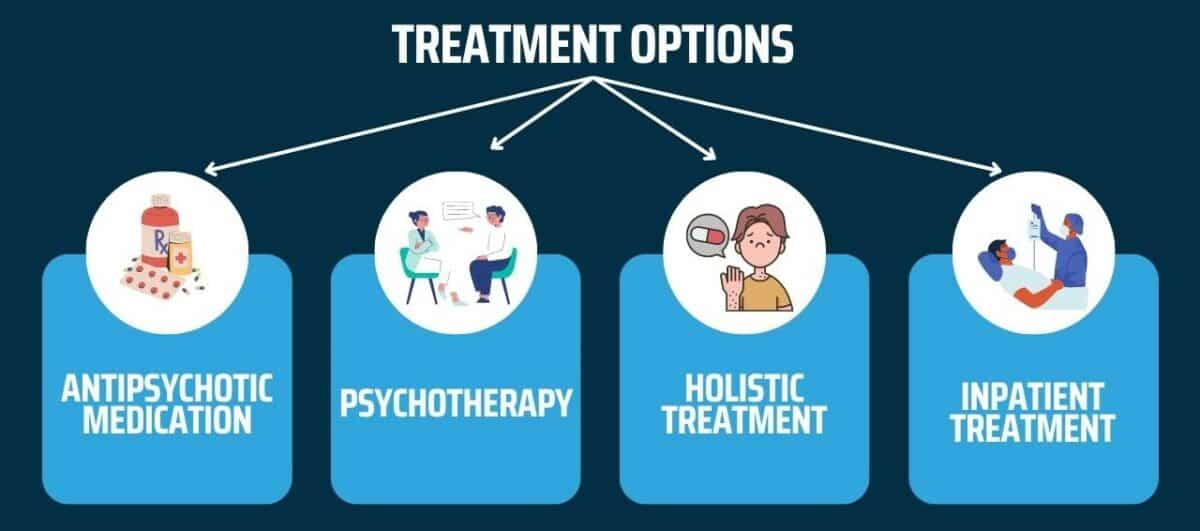Bipolar Disorder with Psychotic Features Treatment Center

Psychotic symptoms that can occur alongside bipolar disorder and treatment options such psychotherapy, and inpatient treatment with URP Behavioral Health.


What is Bipolar Disorder with Psychotic Features?
Mood-congruent Psychotic Features
This is when the content of hallucinations and delusions during a manic episode is consistent with typical manic themes. These include themes like invulnerability and grandiosity, as well as ideas of paranoia or suspiciousness about others doubting your accomplishments and capabilities.
Mood-incongruent Psychotic Features
When you have mood-incongruent psychotic features, the content of your hallucinations and delusions is inconsistent with common themes of a manic episode. Or it’s possible that the content of your symptoms is a mix of both mood-congruent and mood-incongruent themes.
Symptoms of Bipolar Psychosis
Hallucinations
These are false perceptions of events or objects that involve senses like touch, taste, smell, sound, and sight. And while they appear real, they’re not. They can occur due to a chemical imbalance in the brain. Types of hallucinations that often occur during a manic episode include:
- Auditory hallucinations occur when you hear sounds that aren’t real. These are also the most commonly experienced type of hallucination.
- Visual hallucinations involve seeing objects, people, or shapes that aren’t real.
Other types include tactile hallucinations, which occur when you feel something touching your body or movement inside your body. There are also olfactory hallucinations (involving smell), presence hallucinations (feeling like someone is in the room with you), and proprioceptive hallucinations (feeling like your body is moving, such as floating or flying, when it’s not.
Delusions
Grandiose delusions are the most common type of delusion during bipolar disorder. In this type, you have an unshakable belief that you have unique powers or talents. You may also have persecutory delusions that make you feel like people are after you because of your talents. Similarly, you may experience delusions of reference, in which you believe that unrelated events in the world are related to you.
Disorganized Speech
Psychosis during a manic episode may involve experiencing irrational thoughts. Consequently, you may talk too fast, and it becomes difficult for others to follow what you’re saying. Your speech becomes disorganized as you move from one subject to the next, unable to keep your train of thought.
Causes of Bipolar Psychosis
The causes of bipolar psychosis are complex and multifaceted, involving a combination of genetic, biological, and environmental factors. Genetics play a significant role, as bipolar disorder often runs in families. Biological factors include chemical imbalances in the brain, particularly involving neurotransmitters like dopamine and serotonin. Environmental triggers, such as severe stress, trauma, or significant life changes, can also contribute to the onset of psychosis. Understanding these causes helps in developing effective treatment and prevention strategies.
Types of Bipolar Psychosis
Bipolar psychosis manifests itself in two main forms: manic psychosis and depressive psychosis. Manic psychosis occurs during manic episodes, when people experience high spirits, increased energy, and may have delusions of grandeur or hallucinations. Depressive psychosis occurs during depressive episodes characterized by deep sadness, low energy, and psychotic symptoms such as delusions of guilt or worthlessness. Both types have a significant impact on a person’s ability to function, making early diagnosis and treatment important for effective management.
Diagnosing Bipolar Disorder with Psychotic Features
Diagnosing Bipolar Disorder with psychotic features involves a comprehensive evaluation by a mental health professional. The process includes a detailed clinical interview to understand the patient’s medical and psychiatric history, symptom assessment, and identification of psychotic symptoms like hallucinations or delusions during mood episodes. The clinician uses DSM-5 criteria to differentiate between manic and depressive episodes and their psychotic features. Standardized assessment tools and ruling out other conditions through physical exams and lab tests are crucial. Continuous monitoring ensures accurate diagnosis and effective treatment.

Treatment of Bipolar Disorder with Psychotic Features
Antipsychotic Medication
Antipsychotic drugs are useful for alleviating acute mania and providing maintenance treatment. Although typical and atypical antipsychotic medication can reduce psychotic features occurring during acute mania, atypical formulations offer more advantages. Specifically, they can lead to fewer extrapyramidal symptoms and a low risk of tardive dyskinesia. It also reduces suicidality, improves cognition, and doesn’t increase levels of serum prolactin.
Most atypical antipsychotics are as effective as an additional form of treatment alongside mood stabilizers. And treatment-resistant clients, atypical antipsychotics work as a monotherapy solution. Similarly, clients with high levels of non-compliance are prescribed long-acting typical neuroleptic drugs to reduce symptoms.
Psychotherapy
Additionally, mental health practitioners recommend psychotherapy as a way to build your insight and change your behaviors. Studies show that talk therapy can strengthen the brain’s connections by focusing on how you perceive certain feelings and behave in response to them.
The most common talk therapy approach is cognitive behavioral therapy, which is a highly effective, evidence-based therapy. Specifically, talk therapy improves connections in the frontal lobes and amygdala, and research shows that these changes correlate with psychosis remission rates.
Because psychotic symptoms in bipolar disorder occur during a manic episode, the goal of talk therapy is to help you manage a manic episode and prevent hallucinations and/or delusions. This requires teaching you healthy coping strategies to reduce the intensity of manic symptoms.
Holistic Treatment
Most mental health experts recommend holistic treatment, which combines therapy, medication, and learning strategies. Therefore, you’ll benefit from the following:
- Keeping track of your psychotic symptoms on a calendar and monitoring your environment and diet before and after an episode.
- Incorporating wellness therapies like yoga, therapeutic massage, and acupuncture as part of your treatment process.
- Making lifestyle changes like sticking to a consistent sleep schedule, taking medication at the right time, getting daily exercise, and eating a whole-food diet.
Inpatient Treatment
For clients who display severe psychotic symptoms, the best approach involves enrolling in a residential treatment program. Here, they can focus on treatment in an environment that encourages recovery and maintains the progress you make. The goal is to separate you from stressful environments that could potentially trigger a manic episode.
Conclusion
Early diagnosis and treatment can go a long way in improving your quality of life. If you’ve experienced the above-mentioned symptoms during a manic episode, consult a mental health practitioner on the best way to move forward. For specialized care, consider reaching out to URP Behavioral Health for comprehensive rehab, treatment options tailored to your needs.
Let Us Guide You Towards Healing
We know that seeking treatment can be overwhelming, but our staff is here to make the process as smooth as possible. We’re available 24/7 to address any questions or concerns you may have.

